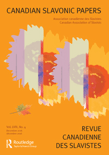
Canadian Slavonic Papers
Scope & Guideline
Illuminating the Past, Present, and Future of Slavic Studies
Introduction
Aims and Scopes
- Cultural Studies and Ethnography:
The journal emphasizes the exploration of cultural practices, identity formation, and social dynamics within Slavic and East European communities, addressing both historical and contemporary contexts. - Historical Analysis and Memory Studies:
A significant focus is placed on the historical narratives and memory politics of the regions, particularly concerning events like the Holocaust, the Soviet era, and national conflicts. - Literature and Arts:
The journal publishes research on literary contributions, artistic expressions, and their socio-political implications, examining both classic and contemporary works from the Slavic canon. - Political and Social Dynamics:
Research on political movements, nationalism, and social change is a core area, particularly in relation to recent events such as the Ukraine conflict and the dynamics of post-Soviet states. - Linguistics and Language Studies:
The journal includes studies on language, including the evolution of Slavic languages and their cultural significance, reflecting the linguistic diversity within the region. - Interdisciplinary Approaches:
Canadian Slavonic Papers promotes interdisciplinary research, integrating perspectives from history, sociology, literature, and cultural studies to provide comprehensive insights into Slavic and East European themes.
Trending and Emerging
- Impact of War on Culture:
There is a significant rise in studies examining the cultural impacts of ongoing conflicts, particularly the war in Ukraine, highlighting how trauma and resilience shape artistic and social responses. - Identity Politics and Nationalism:
Research focusing on identity politics, particularly in the context of post-Soviet nationalism, has gained prominence, addressing the complexities of national identity in a rapidly changing geopolitical environment. - Decolonization and Postcolonial Studies:
Emerging interest in decolonization narratives and postcolonial critiques is evident, reflecting a broader trend towards examining the legacies of imperialism and colonialism in Slavic contexts. - Gender Studies and Feminism:
There is a growing focus on gender issues, particularly the roles of women in social movements and their representation in literature, which underscores the evolving discourse around gender equality in the region. - Digital Humanities and New Media:
The incorporation of digital humanities and the study of new media's role in shaping cultural discourse is increasingly relevant, especially in the context of social media's impact on political activism.
Declining or Waning
- Cold War Studies:
Research focusing on the Cold War and its immediate aftermath appears to be less frequent, potentially indicating a shift towards contemporary issues rather than historical retrospectives. - Traditional National Histories:
There is a noticeable decline in studies centered on traditional narratives of national histories, as scholars increasingly seek to address broader themes like transnationalism and intersectionality. - Soviet-era Cultural Production:
While still relevant, the exploration of Soviet-era cultural artifacts and their implications seems to be less emphasized, possibly due to a growing interest in post-Soviet developments and their impacts. - Regionalism in Literature:
The focus on regionalism within Slavic literature appears to be diminishing, with a more pronounced interest in globalized perspectives and cross-cultural dialogues. - Historical Linguistics:
Interest in historical linguistics and language evolution is observed to be waning, as contemporary sociolinguistic studies gain traction.
Similar Journals
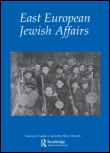
East European Jewish Affairs
Unveiling the Complexities of Jewish Life in Eastern EuropeEast European Jewish Affairs is a prominent scholarly journal published by Routledge Journals, Taylor & Francis Ltd, dedicated to exploring the intricate historical, cultural, and political dynamics of Jewish communities in Eastern Europe. With ISSN 1350-1674 and E-ISSN 1743-971X, this journal has been a critical platform for academic discourse since its inception in 1992, resuming publication after a hiatus in 2005. Although it is not an open-access journal, it provides vital insights into Jewish studies, engaging researchers, professionals, and students alike with in-depth analyses and discussions. The journal currently holds a Q4 ranking in multiple categories, including Cultural Studies, History, and Political Science and International Relations, reflecting its niche yet significant contribution to these fields. The 2023 Scopus rankings position it within the 34th percentile in History and the 10th percentile in Political Science, evidencing its specialized focus and the evolving nature of Jewish studies. For those investigating the unique social and cultural trajectories of East European Jewish communities, East European Jewish Affairs serves as an essential resource.

SLAVONIC AND EAST EUROPEAN REVIEW
Illuminating the Complex Narratives of the Slavic WorldSLAVONIC AND EAST EUROPEAN REVIEW, published by the Modern Humanities Research Association, stands as a pivotal academic journal since its inception in 1971, focusing on the rich cultural, historical, and linguistic landscapes of Eastern Europe and the Slavic-speaking world. With its ISSN 0037-6795 and E-ISSN 2222-4327, this esteemed journal provides a platform for scholars to share innovative research and critical analyses that shape the understanding of these complex regions. Although not open access, it maintains a reputation for rigorous scholarship, reflected in its categorization across multiple fields including Cultural Studies, History, and Literature in prestigious quartiles. The journal's Scopus rankings further illustrate its importance in the academic community, fostering a dialogue among researchers, professionals, and students who seek to deepen their insights into Eastern European studies. As a contributor or reader, you will find the SLAVONIC AND EAST EUROPEAN REVIEW an essential resource in navigating the intricate narratives that define this significant area of scholarship.

Slovo
Challenging Narratives in Slavic and East European ResearchSlovo, published by the University College London, School of Slavonic & East European Studies, is a vital scholarly journal dedicated to the exploration of Slavic languages and cultures, as well as the broader social sciences and humanities. Established with a commitment to advancing academic discourse, Slovo serves as a platform for researchers, professionals, and students interested in the dynamic intersections of literature, history, and cultural studies within Slavic and Eastern European contexts. Although it holds a Q4 ranking in both the Arts and Humanities and Social Sciences categories, the journal’s emphasis on fresh perspectives often invites innovative contributions that challenge conventional narratives. While lacking an Open Access option, Slovo remains integral for those seeking to navigate its multifaceted terrain, ensuring that emerging scholars and established academics alike can engage with rigorous research from 2012 to 2023 and beyond. With its headquarters in London, United Kingdom, this journal not only reflects the rich heritage of its academic lineage but also fosters a vibrant community committed to the exploration of Slavic and East European studies.

SLAVIC AND EAST EUROPEAN JOURNAL
Illuminating the Diversity of Eastern European NarrativesThe Slavic and East European Journal (ISSN: 0037-6752) is a distinguished publication focused on the rich tapestry of Slavic and Eastern European cultures, languages, and literatures. Published by the Ohio State University’s Department of Slavic and East European Languages & Culture, this journal serves as a vital platform for scholars and researchers keen on exploring linguistic diversity and cultural heritage in these regions. With a wide-ranging scope, the journal addresses significant topics within Cultural Studies, Linguistics, and Literature, currently categorized in Q4 and Q3 quartiles across various academic metrics. Although it does not offer open access, anticipation is high among academics seeking to contribute or access cutting-edge research that pushes the boundaries of understanding these complex fields. As it converges from 2009 to 2024, the Slavic and East European Journal continues to uphold its commitment to academic excellence and community engagement, making it an essential resource for anyone dedicated to the study of Slavic and Eastern European traditions.

Slavia-Casopis pro Slovanskou Filologii
Unveiling the Rich Tapestry of Slavic PhilologySlavia-Casopis pro Slovanskou Filologii is an esteemed journal dedicated to the advancement of Slavic philology, published by the SLOVANSKY USTAV AKAD CESKE REPUBLIKY in the heart of the Czech Republic. With its ISSN: 0037-6736, the journal serves as a vital platform for scholarly exchange, embracing a rich academic tradition since its convergence years beginning in 2002. The journal has achieved notable recognition, with a Q3 ranking in Linguistics and Language and a Q2 in Literature and Literary Theory as of 2023, highlighting its contribution to these dynamic fields. Although it does not currently offer open access, its rigorous selection of articles ensures that it remains a crucial resource for researchers and practitioners alike, facilitating a deeper understanding of Slavic languages and literature. Scholars benefit from the journal's extensive research backdrop, enhanced by its current ranks in the Scopus database, underscoring its significant placement within the academic literature landscape. The editorial scope of Slavia promotes innovative inquiries that reflect cultural, historical, and theoretical perspectives endemic to Slavic studies, making it indispensable for professionals, students, and enthusiasts invested in the exploration of Slavic linguistic and literary heritage.
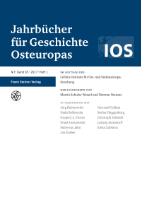
JAHRBUCHER FUR GESCHICHTE OSTEUROPAS
Charting the Course of Eastern Europe's Historical EvolutionJAHRBUCHER FUR GESCHICHTE OSTEUROPAS, published by FRANZ STEINER VERLAG GMBH, is a prominent academic journal dedicated to the exploration of Eastern European history. With its inception dating back to 1978, this journal has consistently provided a platform for scholarly discourse, contributing significantly to the understanding of the region's complex historical narratives. While the journal is not open access, it holds a solid reputation within the academic community, positioned in the Q4 quartile in history as per the 2023 category rankings, and stands at Rank #1636 within the Scopus Arts and Humanities History ranking. The convergence of its publication years throughout the decades emphasizes a long-standing commitment to historical research, thereby making it an essential resource for researchers, professionals, and students interested in Eastern European studies. Explore the intricate dynamics of historical events and cultural developments that shape Eastern Europe through this invaluable periodical.
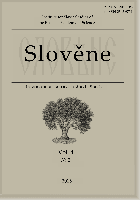
Slovene-International Journal of Slavic Studies
Cultivating Knowledge Across Slavic BordersThe Slovene-International Journal of Slavic Studies, published by the Russian Academy of Sciences, Institute of Slavic Studies, serves as a vital platform for scholarly discourse in the fields of Cultural Studies, History, Linguistics, and Religious Studies. Since its transition to Open Access in 2012, the journal has enriched academic dialogue, enabling wider circulation and accessibility of research findings. Based in the Russian Federation, the journal supports interdisciplinary approaches, inviting contributions that push the boundaries of traditional Slavic studies. With a commendable ranking in the Q3 quartile across multiple categories as of 2023 and respectable Scopus rankings, it stands out as a crucial resource for researchers and students alike, enhancing their understanding of Slavic and related cultural contexts. The journal's commitment to fostering international collaboration and dialogue positions it as an invaluable asset for anyone engaged in the complexities of Slavic studies.

Comparative Southeast European Studies
Unveiling the Complexities of Southeast European Cultures and EconomiesComparative Southeast European Studies, published by WALTER DE GRUYTER GMBH, is an esteemed open-access journal that has been contributing to scholarly discourse since its inception in 2021. With its ISSN 2701-8199 and E-ISSN 2701-8202, the journal is dedicated to the multidisciplinary examination of Southeast European societies, cultures, and economies. The journal strives to foster a nuanced understanding of historical and contemporary issues through an array of perspectives, appealing to researchers, professionals, and students alike. While it currently resides in Q4 for several categories including Anthropology, Economics, and Political Science, it maintains a robust platform for innovative research and dialogue within the region. Situated in Germany, this journal serves not only as a repository of knowledge but also as a catalyst for future scholarly endeavors, with the aim to elevate the discourse surrounding Southeast Europe during the converging years of 2021 to 2024. Its commitment to open access ensures that critical research is readily available, inspiring collaboration and engagement across academic and professional communities.
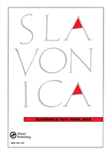
SLAVONICA
Fostering Academic Dialogue on Slavic IssuesSLAVONICA is a distinguished academic journal dedicated to the exploration and analysis of Slavic studies, incorporating a wide array of cultural, historical, and linguistic perspectives. Published by Routledge Journals, Taylor & Francis Ltd, this journal serves as a critical platform for interdisciplinary scholarship, emphasizing the dynamic nature of Slavic cultures and languages. Though it currently does not offer Open Access, SLAVONICA is an important resource for researchers, professionals, and students seeking to engage with the latest academic discourse in the fields of Cultural Studies, History, Literature, and Linguistics, achieving a recognized place in the Q4 quartile across several categories as of 2023. With coverage spanning from 1994 to 2024, and its commitment to fostering academic inquiry, SLAVONICA plays a vital role in elevating the understanding of Slavic heritage and contemporary issues, making it essential reading for anyone interested in the complexities of this region.

ZEITSCHRIFT FUR SLAVISCHE PHILOLOGIE
Enhancing Insights into Slavic Cultural HeritageZEITSCHRIFT FUR SLAVISCHE PHILOLOGIE is a pivotal journal in the field of Slavonic philology, published by Universitatsverlag C Winter Heidelberg GmbH. Renowned for its scholarly rigor and insightful contributions, this journal serves as a key platform for researchers, professionals, and students interested in Slavic languages and linguistics. Despite its classification as a traditional subscription journal, it has maintained a consistent presence in the academic community with contributions that enhance understanding of linguistic, cultural, and literary studies within the Slavic context. With an H-index reflecting its impact and relevance, the journal has historically been indexed in Scopus, ranking in the 34th and 33rd percentiles within the Arts and Humanities and Social Sciences categories, respectively. The journal has featured a range of scholarly articles from 2002 to 2017, providing a rich repository of knowledge for those dedicated to the study of Slavic languages. For any researcher aiming to delve into this dynamic field, ZEITSCHRIFT FUR SLAVISCHE PHILOLOGIE remains an essential resource.